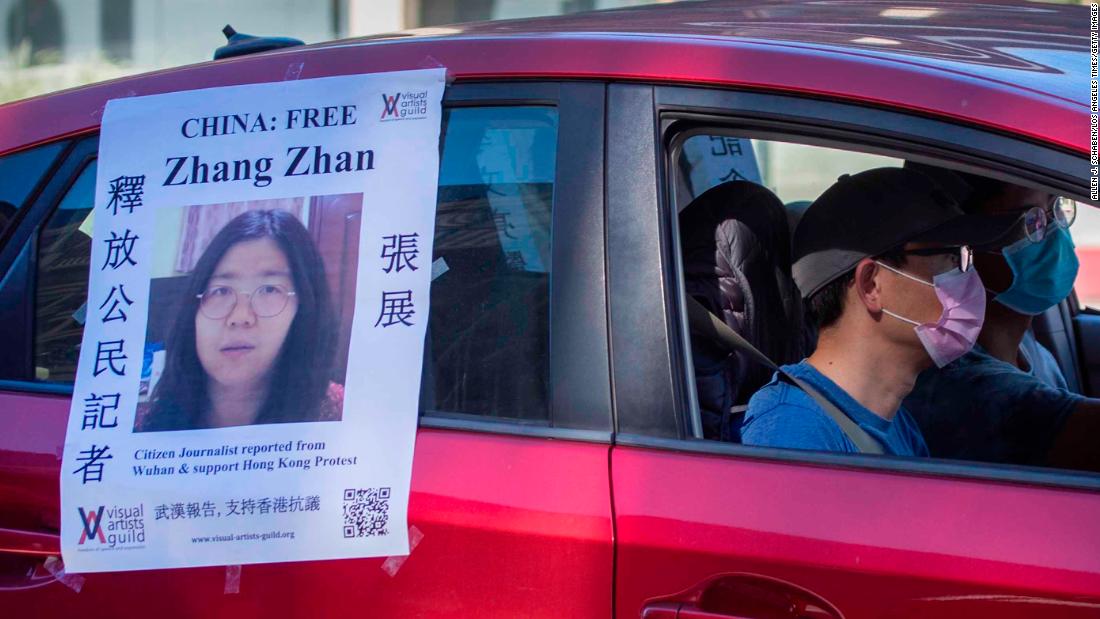
Zhang's real crime: to report factually on the ground at the height of the Covid-19 pandemic, at its then epicenter, Wuhan, in video dispatches that challenged the government's official narrative. And then to stubbornly defy the Chinese government by insisting on her innocence.
Why did this case rise above others? Maybe it's the photos we at the Committee to Protect Journalists (CPJ) received of her in jail, just before the trial. Behind bars and a clear barrier that partly reflects light and obscures her image, a face mask is pulled down just enough to show the feeding tubes fastened into her nostrils. Prison guards shaved the front of her head. Her eyes look right into the camera. They scream misery.
Arrested in May, Zhang went on a hunger strike during her detention, according to Amnesty International. In response, prison authorities have restrained her and forced nutrients into her. Her lawyer told the CPJ, where I work, that she had lost a great deal of weight and had aged decades in jail. Zhang said she fears she will die there. She even showed up at her trial in a wheelchair.
Yet, despite Zhang's misery, her eyes also scream defiance. She's not a pathetic figure. Just the opposite. She's a hero. Zhang, a lawyer by training, went to Wuhan on her own accord. Her reports consisted of talking to ordinary people about what they thought and posting the accounts on Twitter and YouTube.
Yes, sure, she also criticized the government response to the pandemic -- harshly, in fact. But in jail, with a lawyer's sensibility, she has repeatedly denied reporting false news and insisted Chinese law gives her the right to report. And she's correct. Article 35 of China's constitution states: "Citizens of the People's Republic of China enjoy freedom of speech, of the press, of assembly, of association, of procession and of demonstration." During her trial, Zhang insisted that people's speech should not be censored.
On December 1, China held 47 journalists in prison, including Zhang, the most of any other nation, according to an annual prison census conducted by the CPJ. Several others are held for reporting on Covid-19. Others have reported on human rights abuses or labor unrest. Some, like Huang Qi, a pioneer of human rights reporting, are repeat offenders, have suffered from medical neglect and seen their lawyers forced to resign or even disbarred. The Chinese government did not respond to CPJ's questions for comment.
Their treatment is harsh, as described to CPJ by the formerly jailed Lu Yuyu, who recently told The Wall Street Journal that the government crackdown meant "(t)here's no point" continuing his past work documenting unrest. The Chinese government did not respond to CPJ's or the Journal's request for comment.
For all these reasons, Zhang's trial and conviction are about much more than one person running afoul of China's ruling Communist Party. It shows that Chinese citizens can still muster the courage to defy the Communist Party. Her case exposes in sharp relief the hypocrisy of the Chinese government and its application of its constitution, and it is a reminder to all of us about the true character of the regime that has put her in jail and cannot tolerate anyone telling the truth about how it governs.
Foreign governments dealing with China cannot ignore this reality, and they must insist that China end its repeated and gross violations of the human rights of its own people, including its journalists.
"about" - Google News
December 29, 2020 at 01:10PM
https://ift.tt/2M72fmO
What a journalist's jailing for heroic Covid coverage exposes about China - CNN
"about" - Google News
https://ift.tt/2MjBJUT
Bagikan Berita Ini














0 Response to "What a journalist's jailing for heroic Covid coverage exposes about China - CNN"
Post a Comment